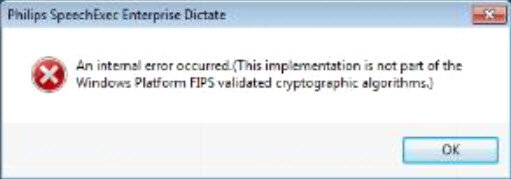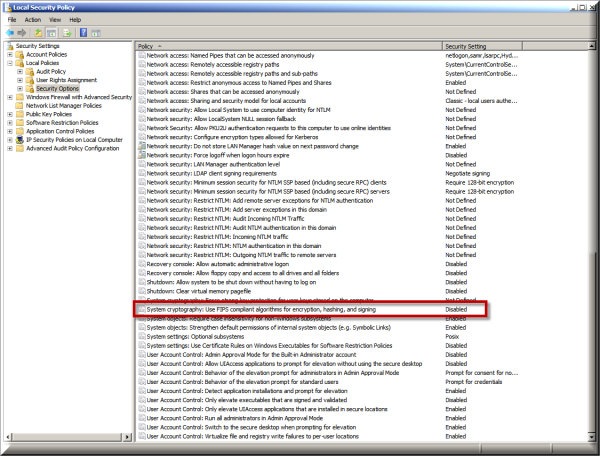Philips and FIPS
System cryptography is available on computers running Windows® Vista and higher, and is commonly enabled in medical practices as part of HIPAA compliance requirements. Unfortunately, Philips® SpeechExec Pro v8.5 and SpeechExec Enterprise v4.6 are not supported on Windows computers with FIPS system cryptography turned on.
SpeechExec and System Cryptography
While the Philips LFH9600 and DPM8000 series voice recorders do offer AES 256-bit encryption, you will not be able to use the Philips software on computers that have enabled this option:
“System Cryptography: Use FIPS compliant algorithms for encryption, hashing and signing.”
FIPS Error Message
When you connect a recorder to the computer, and/or attempt to open the Philips software, you will receive the following error message:
“An internal error occurred. (This implementation is not part of the Windows Platform FIPS validated cryptographic algorithms.)

The Philips support team has confirmed that there is no solution at this time and stated that they will work on it in future software releases.
How to Resolve This Error
If you’re running SpeechExec Enterprise Dictate or Transcribe, you will need to configure the local security policy on your system to allow FIPS non-compliant algorithm implementations.
1. On the Server, go to Control Panel > Administrative Tools > Local Security Policy > Local Policies > Security Options.
2. Disable the “System cryptography: Use FIPS compliant algorithms for encryption, hashing, and signing” option.
Possible FIPS-Compliant Workaround
Those users that are required to have system cryptography (FIPS) enabled are encouraged to use the Olympus® Dictation Management System R6.3.1, as it seems to work well on encrypted hard drives. The only known issue at this time is that users will be unable to automatically email and/or FTP audio files with the Olympus software. Olympus is working on resolving that limitation, and expects full support for this in the R6.4 update.
Verification Source and Date
Philips Support Team and in-house testing, 01/2015

